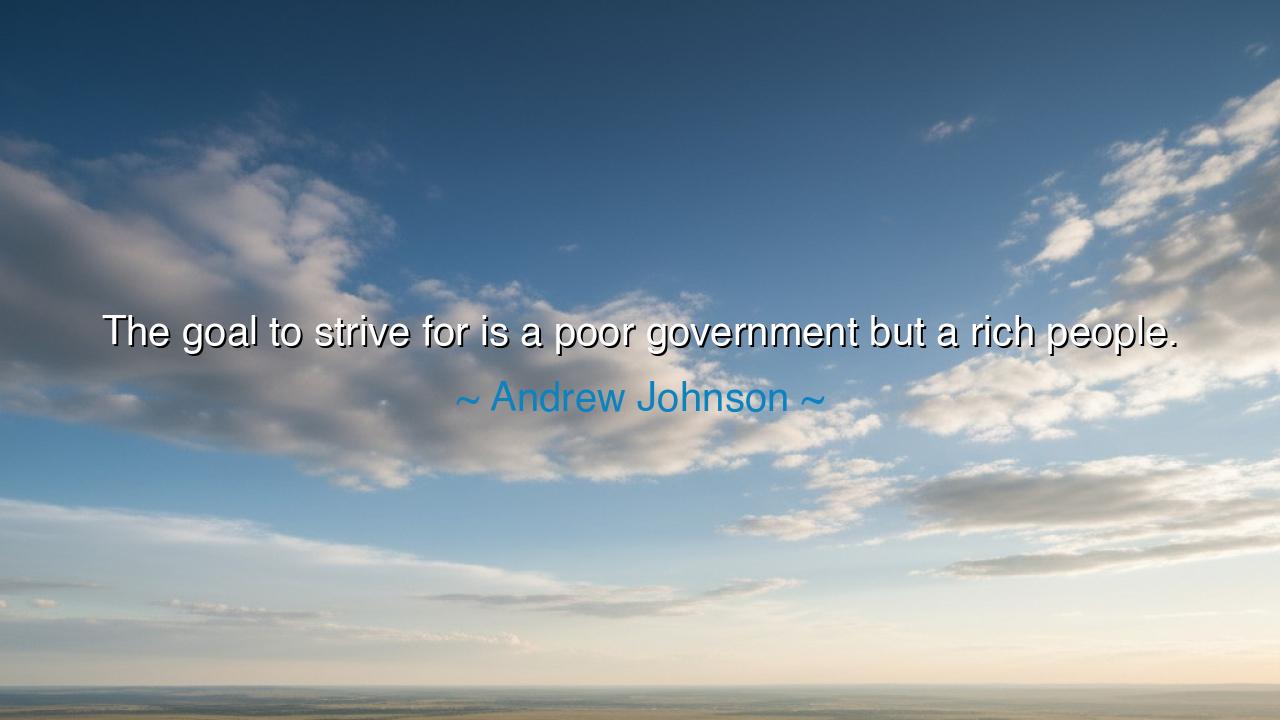
The goal to strive for is a poor government but a rich people.






The words of Andrew Johnson, the seventeenth president of the United States, resound with a paradoxical wisdom that pierces through the ages: “The goal to strive for is a poor government but a rich people.” At first hearing, it seems a strange ambition—that a government should be poor. But in truth, Johnson speaks of a deeper kind of wealth, one rooted not in the coffers of the state but in the prosperity and dignity of its citizens. His vision is that of a nation whose strength flows upward from its people, not downward from its rulers. A poor government, in this sense, is not weak—it is restrained, humble, and uncorrupted by greed. And a rich people are not only those of material wealth, but of independence, virtue, and enterprise.
The origin of this quote emerges from the turbulent era following the American Civil War, when Johnson ascended to the presidency upon the death of Abraham Lincoln. The Union had been preserved, but the nation was bleeding—its treasury drained, its cities scarred, and its people divided. In those uncertain years, Johnson, himself born of poverty and self-made through hard labor, believed deeply that the government must not become a master over the people, but a servant. He had risen from the humblest beginnings—a tailor’s apprentice in Tennessee—to the highest office in the land, and he knew firsthand that prosperity and freedom are born not from state generosity, but from personal effort. His words reflect the creed of a man who valued human industry above government indulgence.
In the style of the ancients, we may see Johnson’s wisdom as a lesson in balance. For throughout history, the rise and fall of nations have hinged upon this truth: when the government grows rich, the people grow poor; when the state hoards power, the citizens lose their strength. In the empires of old—Rome, Byzantium, and Spain—we find this pattern repeated. Their governments grew vast, their treasuries swollen by conquest and tax, while the citizens grew idle, dependent, and discontent. The golden age of Rome was not born from imperial wealth, but from civic virtue—when the farmers, merchants, and craftsmen built their fortunes with their own hands. When the people became rich in spirit, the nation flourished; when the state sought to replace their labor with largesse, decay followed like night after sunset.
Johnson’s words echo this ancient law. A poor government is one that lives simply, spends sparingly, and interferes little. It does not bleed its people through endless taxation, nor bury them beneath laws that stifle initiative. It governs with humility, trusting that free men and women, left to their own energy and conscience, will create a more prosperous and virtuous society than any government decree could ever command. And a rich people are those whose wealth comes not from the handouts of the powerful, but from their own labor, knowledge, and courage. The true wealth of a nation lies not in its treasury, but in the skill of its workers, the integrity of its merchants, and the wisdom of its thinkers.
Let us recall a moment from the history of the young republic. In the early days of America, under Thomas Jefferson’s ideal of limited government, the people were indeed “rich” in this sense—not in luxury, but in liberty. Farmers owned their land, artisans practiced their trades, and local communities governed themselves with little interference from afar. The government, small and frugal, spent only what it must to protect the common good. The result was not poverty, but vigorous independence, the very lifeblood of democracy. Yet as nations grow older, the temptation arises for governments to expand—to promise comfort in exchange for freedom, wealth in exchange for obedience. Johnson’s warning stands against this eternal temptation.
There is also a moral truth hidden within his words. A poor government is one that refrains from corruption, from enriching its officials at the expense of its people. A state that seeks luxury for its rulers breeds decay in the soul of the nation. But a people who grow rich in integrity, in self-reliance, and in mutual respect become ungovernable by tyranny. The wisdom of Johnson is thus not merely economic—it is spiritual. He speaks of a nation of character, where the government remains humble and the people grow mighty through their labor and virtue.
So, my children of the future, let this teaching be engraved upon your hearts: the wealth of a nation belongs in its homes, not in its palaces. The greatness of a people is not measured by the grandeur of their government buildings, but by the hope in their hearts, the freedom in their hands, and the honesty in their dealings. If you would build a strong society, demand simplicity of your rulers and excellence of yourselves. Let your government be poor in extravagance but rich in justice; let your people be rich in opportunity but humble in spirit.
For as Andrew Johnson declared, the goal is not to create a powerful government ruling over weak citizens, but a free people so capable and prosperous that their government need only guide, not control. When the people are rich in wisdom, courage, and virtue, the government can afford to be poor—and in that poverty of power lies the greatest wealth of all: the enduring freedom of mankind.






AAdministratorAdministrator
Welcome, honored guests. Please leave a comment, we will respond soon